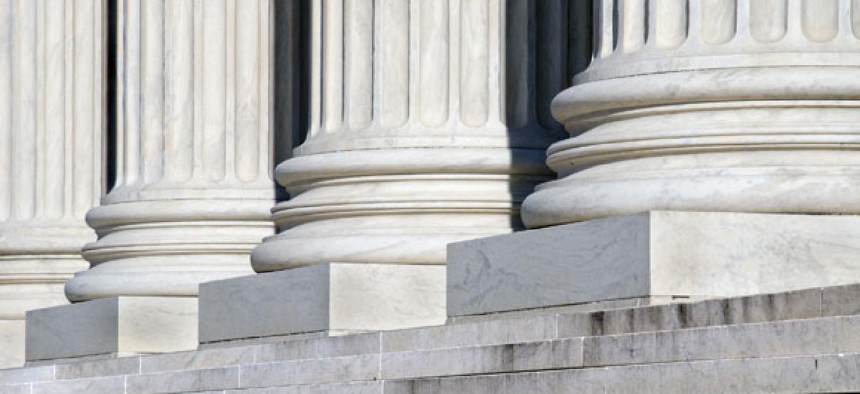
Tim Mainiero/Shutterstock.com
Analysis: The End of Government as We Know It
The inevitable results of 'radical connectivity.'
A year ago, I wrote about the decline of American institutions through the eyes of Johnny Whitmire, an unemployed construction worker, who lost his home due to systematic failures of his bank and employers as well as city, state and federal governments. “You can’t trust anybody or anything anymore,” Whitmire said, standing outside the $40,000 home he ceded to his mortgage company.
In a new book, “The End of Big: How the Internet Makes David the New Goliath,” author Nicco Mele argues that such cynicism is not only warranted, it’s the inevitable result of social and political changes wrought by what he calls “radical connectivity.”
That is, our ability to send vast amounts of data instantly, constantly and globally—breathtaking new tools that “empower the individual at the expense of existing institutions and ancient social structures.” These include government, businesses, entertainment, military, schools, media, religion, and other big institutions designed to protect and sustain people like Whitmire.
“Our institutions have in fact failed us,” writes Mele, a Harvard Kennedy School faculty member and technology expert who worked for both Howard Dean and Barack Obama.
In a must-read for political and policy junkies as well as futurists, Mele argues that the Democratic and Republican parties must urgently embrace the bottom-up ethos of radical connectivity -- or perish. He also says arguments over the size of government are outdated, because the real question is how we redefine governing for the digital age.
“When big government gets too powerful, we risk authoritarianism and an erosion of individual autonomy. Whittle it away, though, and you get something else—chaos,” Mele writes. “Should present trends go unchecked, it is easy to imagine a nightmare scenario of social breakdown facilitated by radical connectivity.”
Sound extreme? Consider, as does Mele, the harsh lessons of history. After describing the fall of seemingly immutable European monarchies at the turn of the 20th century, Mele writes:
“We’re at the beginning of a similar epochal change in human history. Scan the headlines every morning—through your Facebook and Twitter feeds—and you can feel history shifting under your feet. Every day I find more and more evidence that we are in the twilight of our own age, and that we can’t quite grasp it, even if we sense something is terribly amiss. This transformation transcends any one realm of life—it’s all-encompassing, even if, as we’ve seen, it proceeds unevenly and paradoxically. Our twentieth-century institutions, which seem as foundational or ahistorical as hereditary monarchy, are on the cusp of collapse—or, if not outright collapse, of irrelevancy and anachronism.”
“Something is terribly amiss”—a summation that especially resonates after a week of momentous events that both challenged and exposed ill-equipped institutions of government: The Boston City Marathon; ricin-laced letters sent to Washington; the explosion of a lightly regulated fertilized plant in Texas; and the demise of gun-safety legislation drafted in response to the Sandy Hook Elementary School massacre. The quick identification of the Boston suspects was a victory for old-school police work, both helped and hindered by social media, smartphones, security cameras, and other assets of a digitally woven world.
Polls consistently show our faith in institutions in steep decline. In particular, trust in Washington is at near-record lows because the current model is a “vending machine government,” a phrase Mele borrows from technologist Tim O’Reilly to describe public frustration. Politicians make promises, we pay taxes, and our participation is limited to “shaking the vending machine.”
Instead, Mele writes, government should be considered a “platform” upon which individuals, organizations, and companies can build services and offerings that suit the times—flexible, transparent, and accountable.
“Essentially, government as a platform presume that government should provide an underlying infrastructure and then let us build on top of that infrastructure in a wide variety of ways,” Mele writes. “It does not necessarily mean smaller government—but it does mean the end of Big Government, with many smaller units of government.”
It also means new a new ethic of leadership. Mele would convene a constitutional convention (Thomas Jefferson imagined one every generation) to struggle with the questions of radical connectivity. “The reality of history has had precious few examples of democracy,” Mele said. “We’re a rarefied category—one that could use some more experimentation if it is to survive the digital age.”
After devoting chapters to specific institutions—media, political parties, the entertainment industry, government, the military, and big business—Mele offers some broad solutions. They include demanding more thoughtful, inspirational leadership.
He praises President Obama’s 2008 campaign for harnessing the power of the individual and radical connectivity to build a bottom-up movement. “Unfortunately, this impressive fusion of top-down leadership and distributed individual action across the network seemed to wilt once Obama actually came to occupy the White House,” he wrote.
“The reason for that is clear: The institutions of Washington, D.C.—namely the executive branch and the Democratic National Committee—are not nearly as flexible and malleable as political campaigns are.”
That assessment made me think of Whitmire who told me a year ago that he had voted for Obama in 2008 but had grown disappointed. “It’s not all his fault. He’s got a lot aligned against him,” Whitmire said at the time. “The system is set up for our leaders to fail."
Coincidentally, while I was writing this book review, Whitmire e-mailed me to say his mortgage company, out of the blue, “gave me my house back and released the lien off it for some reason … after everything they put me through.”
Whitmire is not sure why. Mortgage company paperwork mentions a federal loan-forgiveness program, he said, but Whitmire suspects he got special treatment because of media attention.
He is grateful. But he is skeptical, too: His credit is still a mess, he is still unemployed, and "our government still doesn't much work. Hopefully, there’s other people in my situation who got their houses back after the government and banks did them wrong,” he said in a telephone interview from his new-old home. “But, somehow, these days, you’ve just got to doubt it. Sadly, I doubt it.”
As Mele might say: Until we end big, there will be no end of doubt.
(Image via Tim Mainiero/Shutterstock.com)







